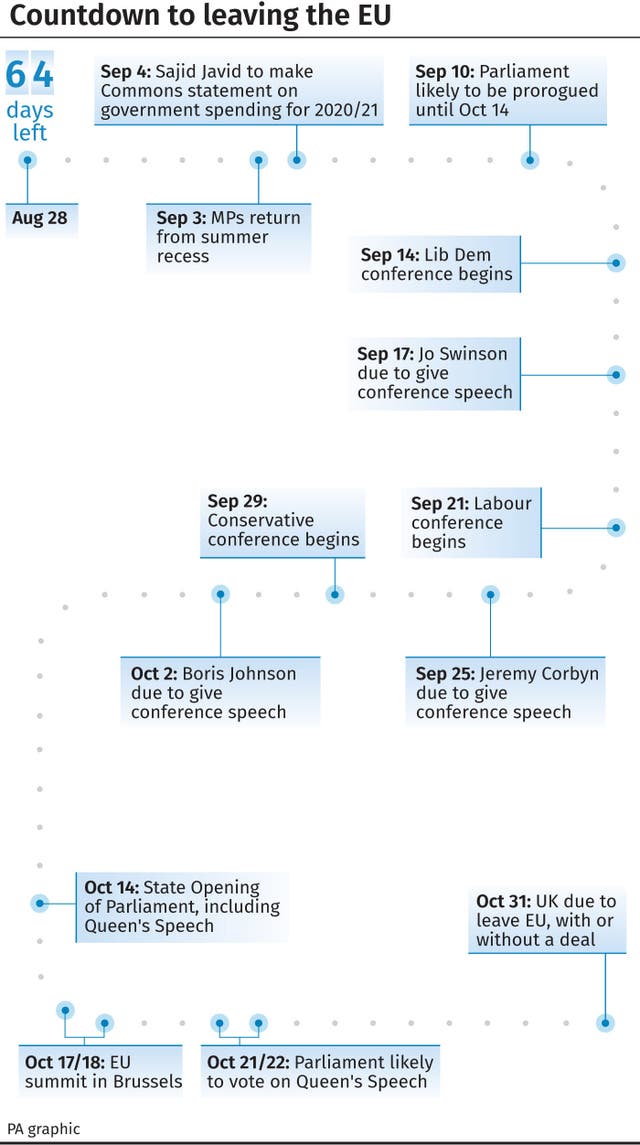
Boris Johnson has asked the Queen to prorogue Parliament, which will effectively suspend it for a month.
The Prime Minister insists he is doing so simply to set out his “exciting agenda” in a Queen’s Speech on October 14.
But critics, including Commons Speaker John Bercow, have lambasted the move, calling it a “constitutional outrage” designed to stop MPs from intervening as the UK heads towards a no-deal Brexit on October 31.
Here are some of the key questions and answers triggered by Wednesday’s move:
– What does prorogation mean?
Prorogation marks the end of a parliamentary session. The current session, which started on June 21, 2017 with the last State Opening and Queen’s Speech, has been the longest in history.
READ MORE: Nicola Sturgeon accuses Johnson of 'dictatorship'
– Who does it?
The Queen formally prorogues Parliament following guidance from the Privy Council, which is her body of advisers made up mainly of senior politicians.
 (PA Graphics)
(PA Graphics)
– Why does Boris Johnson want to prorogue Parliament now?
A new Government brings with it new plans and legislation which are set out in a Queen’s Speech. Mr Johnson insists he has asked the Queen to bring about the end of the current session of Parliament so he can start anew.
– What happens during prorogation?
While Parliament is prorogued, MPs and peers cannot formally debate policy and legislation or make any laws of their own.
Parliamentary scrutiny is suspended and the powers of the Houses of Commons and Lords are effectively taken away until the next Queen’s Speech.
– How long will Parliament be prorogued for?
Prorogation normally tends to be for a short amount of time – no longer than two weeks, with it leading to either a general election or the start of a new Parliamentary session.
Under the new plan, Parliament is set to be dissolved in the second week of its September sitting, possibly as early as Tuesday September 10, with MPs due to return for the Queen’s Speech on October 14.
Parliament had been due to break for its conference recess for at least two weeks in the lead up to October, even before the news of the prorogation broke, with Number 10 arguing that MPs are only losing an extra four sitting days in total.
READ MORE: Boris Johnson planning extended suspension of Parliament

– So why has the move sparked such anger?
There have been fears for a number of months that, should the Government not be able to strike an exit deal with the European Union, the Prime Minister could look to prorogue Parliament to prevent MPs from attempting to stop the UK leaving without a deal.
Critics believe this is what he is doing now. Senior opposition figures and Tory opponents of a no-deal Brexit met on Tuesday to draw up plans to stop the UK crashing out of the EU without an agreement. A day later the PM has effectively moved to curtail their time to draw-up legislation that would prevent Britain from exiting without a Withdrawal Agreement signed-off.
– So could a snap general election still be on the cards?
Commentators saw the surprise announcement that Chancellor Sajid Javid will set out Whitehall spending budgets next week as a sign that the new administration was ramping up plans for an early election.
But inviting the monarch to Parliament for the pomp and ceremony of the Queen’s Speech on October 14 would be an odd thing to do if the PM is actually planning a snap election.
However, if opposition and rebel Tory MPs unite behind a no-confidence motion against the Government in retaliation against the plans to prorogue, that could force Parliament into a stalemate where a general election is the only resolution.



Why are you making commenting on The Herald only available to subscribers?
It should have been a safe space for informed debate, somewhere for readers to discuss issues around the biggest stories of the day, but all too often the below the line comments on most websites have become bogged down by off-topic discussions and abuse.
heraldscotland.com is tackling this problem by allowing only subscribers to comment.
We are doing this to improve the experience for our loyal readers and we believe it will reduce the ability of trolls and troublemakers, who occasionally find their way onto our site, to abuse our journalists and readers. We also hope it will help the comments section fulfil its promise as a part of Scotland's conversation with itself.
We are lucky at The Herald. We are read by an informed, educated readership who can add their knowledge and insights to our stories.
That is invaluable.
We are making the subscriber-only change to support our valued readers, who tell us they don't want the site cluttered up with irrelevant comments, untruths and abuse.
In the past, the journalist’s job was to collect and distribute information to the audience. Technology means that readers can shape a discussion. We look forward to hearing from you on heraldscotland.com
Comments & Moderation
Readers’ comments: You are personally liable for the content of any comments you upload to this website, so please act responsibly. We do not pre-moderate or monitor readers’ comments appearing on our websites, but we do post-moderate in response to complaints we receive or otherwise when a potential problem comes to our attention. You can make a complaint by using the ‘report this post’ link . We may then apply our discretion under the user terms to amend or delete comments.
Post moderation is undertaken full-time 9am-6pm on weekdays, and on a part-time basis outwith those hours.
Read the rules hereLast Updated:
Report this comment Cancel